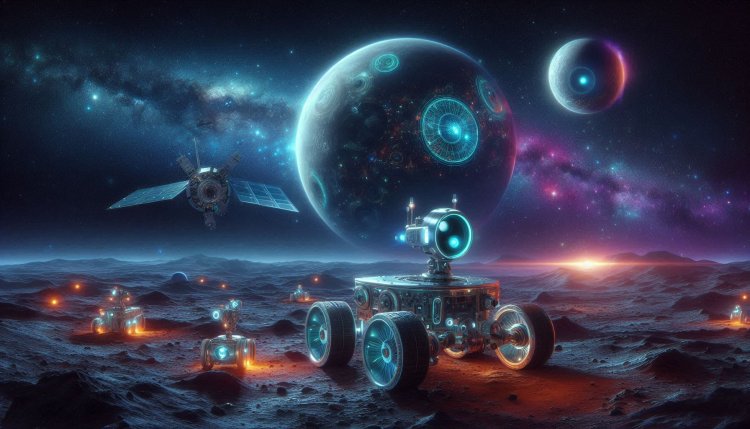AI in space exploration: Autonomous spacecraft and rovers
"Discover the groundbreaking use of AI in space exploration with autonomous spacecraft and rovers. Explore the future of interstellar discovery and innovation."

AI in Space Exploration: Autonomous Spacecraft and Rovers
Artificial Intelligence (AI) has revolutionized space exploration by enabling autonomous spacecraft and rovers to perform complex tasks without constant human intervention. AI-powered systems have significantly enhanced the capabilities of space missions, allowing for more efficient data collection, analysis, and decision-making in the vast and challenging environment of space.
Autonomous Spacecraft
Autonomous spacecraft are equipped with AI systems that enable them to navigate, communicate, and make decisions independently. These spacecraft can adapt to changing conditions in space and execute tasks with precision and efficiency. One of the key advantages of autonomous spacecraft is their ability to operate in real-time without the need for continuous communication with Earth-based controllers.
AI algorithms play a crucial role in various aspects of autonomous spacecraft operations, including:
- Autonomous Navigation: AI-powered navigation systems help spacecraft to maneuver through space, avoid obstacles, and reach their destination accurately. These systems use sensor data and onboard algorithms to make real-time decisions during the journey.
- Autonomous Communication: AI enables spacecraft to communicate with Earth, other spacecraft, or robotic systems without human intervention. This capability is essential for coordinating complex missions and transmitting data back to Earth.
- Autonomous Decision-Making: AI algorithms can analyze data collected by spacecraft instruments and sensors to make decisions on the fly. This allows spacecraft to respond to unexpected events or anomalies during their mission.
AI-Powered Rovers
Rovers are robotic vehicles designed to explore the surface of planets, moons, and other celestial bodies. AI technologies have transformed rovers into intelligent and autonomous explorers capable of conducting scientific experiments, collecting samples, and navigating challenging terrain without human assistance.
Key applications of AI in rover operations include:
- Autonomous Navigation: AI algorithms help rovers to plan their routes, avoid obstacles, and make decisions on the best path to take. This is crucial for exploring unknown and hazardous terrain on distant planets like Mars.
- Scientific Data Analysis: AI systems onboard rovers can analyze images, spectra, and other data collected during exploration to identify interesting features, conduct experiments, and prioritize targets for further study.
- Sample Collection and Analysis: Rovers equipped with AI can autonomously collect samples from the surface of planets or moons, analyze them onboard, and transmit the results back to Earth. This capability is essential for understanding the composition and geology of extraterrestrial bodies.
Benefits of AI in Space Exploration
The integration of AI technologies in space exploration offers several benefits, including:
- Increased Efficiency: Autonomous spacecraft and rovers can perform tasks more quickly and accurately than human operators, leading to faster data collection and analysis during missions.
- Enhanced Safety: AI systems can help spacecraft and rovers navigate hazardous environments and avoid potential risks, reducing the likelihood of accidents or mission failures.
- Extended Mission Lifetimes: Autonomous systems allow spacecraft and rovers to operate for longer periods without human intervention, enabling extended exploration missions and scientific discoveries.
- Real-Time Decision-Making: AI enables spacecraft and rovers to make decisions in real-time based on sensor data and mission objectives, improving the flexibility and responsiveness of space missions.
Future Outlook
The use of AI in space exploration is expected to continue expanding in the coming years, with advancements in machine learning, computer vision, and robotics driving further innovations in autonomous spacecraft and rovers. Future missions to Mars, the Moon, and beyond will likely rely heavily on AI technologies to enable complex scientific investigations and ambitious exploration goals.
As AI continues to evolve, space agencies and private companies are investing in research and development to enhance the capabilities of autonomous systems in space. From autonomous drones for planetary exploration to AI-powered spacecraft for interstellar travel, the future of space exploration promises to be shaped by the transformative potential of artificial intelligence.
Conclusion
AI has revolutionized space exploration by enabling autonomous spacecraft and rovers to operate independently in the challenging environment
What's Your Reaction?

















